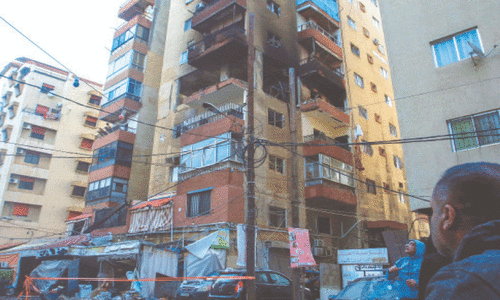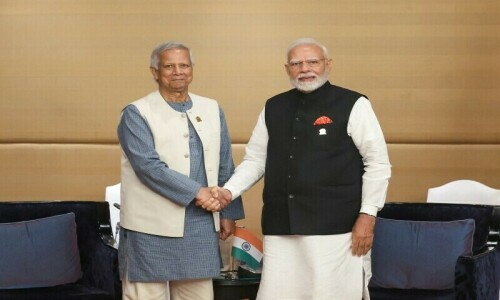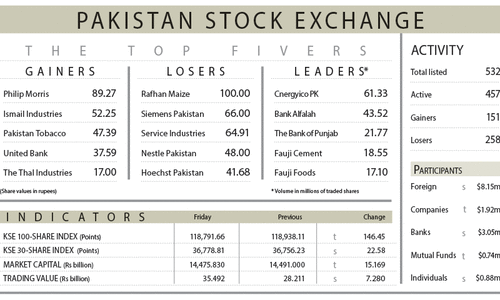BURNING utilities bills is all the rage across the country these days. Amidst stifling inflation, the choicest invective is reserved for electricity generation and distribution companies by the rioting public. We are all, at least partially if not equally, responsible for the dire straits we find ourselves in.
TV anchors are hyperventilating about consumers’ inability to pay ever-increasing power tariffs. Their guests, usually fellow anchors or damp squibs who have been advising successive governments, offer mealy-mouthed excuses.
No one mentions the importance of a diverse energy portfolio, ie, the right mix of hydel, renewable, and thermal generation sources. The elephant in the room is why acquiring nuclear power plants is such an uphill task for us. What made nonproliferation such a non-starter?
Everyone amongst us has enjoyed subsidised fuel, electricity and gas. When we could hardly afford one air conditioner, we ran five thanks to the subsidy. The circular debt has been accruing ever since. In the 1980s, a group called Madagascar had a hit song that went: “Everybody wants to see the rainbow, but nobody wants the rain; everybody wants to feel the good times, but no one can stand the pain.” The pain is here, the wounds are self-inflicted.
Everyone who votes without caring for manifestos, does not hold their representatives accountable, and demands they and their ilk pay progressive taxes is responsible for the situation. People who can afford to and yet do not convert their homes and businesses to renewable energy are responsible. People who cannot afford such conversion are guilty of not demanding easy access to finance.
Who is responsible for our power crisis?
Anyone breathlessly asking when the next elections will be held without asking the prospective losers — for there will be no winners in a long time — how they would resolve the multiple crises is responsible. Everyone who supports Tom because he lives on, or Harry for being handsome, or Dick for just being himself is responsible.
Fundamentalists against river diversion are responsible, for dams cannot be built without it and a lot of hydel generation opportunities are lost due to it. Fundamentalists against population management are responsible for you cannot feed a population of nearly 250 million that continues to grow at a dizzying pace without diverting rivers.
All who celebrate May 28 are responsible, for it came with a self-fulfilling prophecy of ‘we will eat grass’. All elected and unelected rulers are responsible for skewed policies and priorities; we are responsible for letting them get away with it.
The question is not how to bring down the bills, but how to increase income and purchasing power. We spend more than we earn and import more than we export. Expenses can only be curtailed up to a point, beyond that all you can do is increase earnings, ie, taxes and exports.
Economists just cannot agree on a universal tax-to-GDP ratio required to run a modern state; however, anything less than 15 per cent would barely cover running the judicial system and policing, forget education and health, what to talk of investment in infrastructure and environmentally sustainable, reliable and affordable sources of energy.
DDT was banned in most parts of the world in the early 1970s, but we are hooked to it: debt, defence, and terrorism. The last ‘t’ can also denote taxes — both from non-collection and squeezing only those already in the tax net perspective.
That the IPPs are evil is another perspective. Imagine leasing a car and then insisting on paying only six instead of 12 annual instalments because for six months it remained parked. Another example of refusing to pay the idle capacity — a name for capacity payment — is to tell your cab driver you will not pay for the time the vehicle was idling at traffic signals or caught in a traffic jam.
The only way to make this unavoidable clause in the power generation and purchase contracts work in our favour is to ensure that the plants are never idle. In other words, we create conditions where the industrial sector demands and consumes as much power as the plants are designed for and the dispatch and distribution system is up to task.
It’s easier said than done: manufacture what amidst boom-and-bust crop cycles, and an ecology fraught with floods and drought? An unaccountable and visionless leadership, a hapless and heedless electorate, a paranoid worldview, and a pathological aversion to anyone turning a profit do not make a confidence-inspiring and welcoming place for investment.
A few months back, everyone waited for the IMF bailout. As soon as it came, the ‘conditionalities’ began to rankle. Now, everyone awaits saviours from the sandy lands, but who can save us from ourselves?
The writer is a poet. His latest publication is a collection of satire essays titled Rindana.
shahzadsharjeel1@gmail.com
Published in Dawn, September 9th, 2023














































